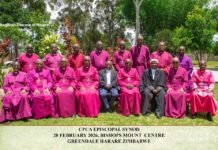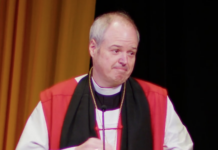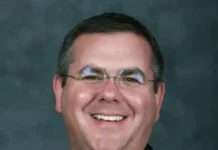Dear Members of the Episcopal Church:
For the past several months, news of the Rev. Charlie Holt’s election as bishop coadjutor in the Diocese of Florida has been roiling The Episcopal Church. It is a complicated situation that has raised questions about the right of dioceses to choose their own bishops, the church’s commitment to include all people, our denominational judicial system, our canons, and bishops’ accountability for historical actions and decisions.
It is not a situation that has been made better by social media. As I consider my response to this election, I am concerned that we have become willing for people to cut and paste comments and videos together in lieu of speaking to the elected person or the diocese and willing to raise the alarm without seeking information and mediation. Will this be the future of all disputed elections?
As Christians, we are invited to go to those whom we have a problem with and try to work it out. We are invited to go with others with whom we disagree and work it out. We are invited to a higher engagement than the world in order that we might build a beloved community with all people, not just with those with whom we agree. In this matter, we have fallen short of that mark.
What I know about the situation as it stands today:
Many standing committees and bishops have made decisions without speaking with Charlie Holt or leaders in the Diocese of Florida. In a case where we are deciding a diocese’s future, I wonder if that is a faithful and responsible process?
The Diocese of Florida has invited Bishop Mary Gray-Reeves, an experienced leader and vice president of the House of Bishops, to help create a listening and mediation process. That process is well underway and making progress.
I know that people across the Diocese of Florida are now grieving that the church that is saying “no” to their bishop, and many are receiving that as a personal “no” of them as Episcopalians. These faithful people have stayed and continued to work for the kingdom of God in their diocese as a loyal part of the Episcopal Church. They were told the tent is big enough but are now are being told it is not quite big enough for them.
I understand the Diocese of Florida’s leadership is working to gather the diocese to fix its canons. I also understand that the problem with the canons, coupled with the division in the diocese, may mean that it is very difficult to elect any bishop (even a bishop provisional) at this time. We might believe that people in the Diocese of Florida will keep showing up to hold elections until one of them finally gains approval, but I think that will not be the case.
My experience is that the politics of the world can be all too often mimicked in the church.
I know that the litmus test of theology is not a good precedent. We have tried it before from every side. It is not pretty and does not have an outcome that is Gospel-oriented.
I also know that not all people of color in the Episcopal Church disagree with Charlie’s theology. Yet, I have actually heard it said regarding those of color that Charlie has worked with, “Well those are not the people of color like us.” I just didn’t think that was the vision of the kingdom of God we were all striving towards.
Finally, I have never been big on caucuses and church political groups, though they have a long history in both the Anglican and Episcopal Church. I find it helpful to remember that caucuses, like other political parties, gain authority by stark contrasts and represent the members of the caucus, and not always the greater good.
Here in Texas, we have a particular responsibility to wrestle with the questions raised by the Diocese of Florida’s election. Charlie, who has twice been elected bishop coadjutor in the Diocese of Florida, has been a faithful priest of our diocese for six years. The Diocese of Texas is a big and wide tent, and it is also home to people who have expressed grave concern about this election. As I have thought about my own response, I have done my best to consider all these perspectives together with the canonical matters at hand.
In so doing, we are working diligently on racism and racial justice. We are standing with the Episcopal Church and paying our full share requested and more. We are speaking for and with women, LGBTQ+, immigrants, the disaffiliated, and those without care; more than that, we are working together to make Texas a better place for all people.
So here are the key issues I see:
–First, there is a ruling of the Court of Review that casts doubt on the Diocese of Florida’s election. It says that several clergy who serve in that diocese should have been given canonical residence, and therefore a vote at the electing convention but were not. The Diocese of Florida is clear that none of the clergy named in the report qualify for canonical residence under the Diocese Florida’s longstanding policies.
The Court of Review’s ruling raises issues about our church’s canons that govern canonical residence and clergy cures. Many dioceses have policies about clergy canonical residence that are similar to that of the Diocese of Florida, and those policies now seem to stand in opposition to the Court of Review’s ruling. Regardless of what happens with this election, the Diocese of Florida and all dioceses in the Episcopal Church will need to review their policies regarding transfers, cures, and letters dimissory in light of the court’s opinion and ensure that those policies are in line with the canons and protect the bishop’s oversight of cures and authority to select who serves in their diocese. Many of our dioceses will also need to review our canons on lay quorum at convention which may be, like that of the Diocese of Florida, outdated and difficult to implement.
–Second, there is the need for the church to care for the people of the Diocese of Florida. They are suffering under the expense and weight of two elections, a church media firestorm, and the use of social media to spread half-truths. As fellow Episcopalians, we must concern ourselves with the welfare of this diocese, recognizing especially that its laypeople elected the Rev. Holt by significant margins in both elections.
Some people in the Diocese of Florida have raised concerns about their relationship with their current bishop diocesan, the Rt. Rev. John Howard. These concerns must be taken seriously and reviewed in light of both our current canons and an understanding that the canons on marriage and human sexuality have changed dramatically since Bishop Howard’s early episcopacy.
I also hope that as Bishop Howard prepares to retire, all of us will thank him for the work he did in the early years of his episcopacy, at great personal cost, to keep the Diocese of Florida in the Episcopal Church. He and the people of the Diocese of Florida have remained resolutely committed to the Episcopal Church despite the pain and expense they incurred when many of their clergy and laypeople left it in the early years of this century. The Diocese of Florida is a full and faithful part of the Episcopal Church, and we must proceed with care for their long-term health and flourishing as our siblings in Christ.
–Third, there is the matter of the Charlie’s suitability to serve as bishop in the Episcopal Church. Because he has been under my care since 2017, I believe I can speak authoritatively to the questions that have been raised.
During his time in the Diocese of Texas, Charlie has been a good member of our clergy and has made positive contributions. He has been in relationship with diverse members of our clergy with no cause for concern. I would add that I don’t always recommend priests who are nominated for the episcopate, but I believed Charlie could help the Diocese of Florida move forward and become a more inclusive and welcoming diocese. If I did not think so, I would not have endorsed his nomination.
At the meet and greet sessions in Florida, Charlie made some clumsy and unexamined comments that revealed his need to work on understanding the experiences of people who are different from him. Those comments were circulated in videos edited for maximum effect by people who did not wish him well.
Since then, Charlie has apologized publicly and privately to individuals he knows were harmed by this words, including to a member of the House of Deputies LGBTQ+ Caucus, despite that group’s reports to the contrary. He has committed publicly and privately to upholding marriage equality in the Diocese of Florida without forcing congregations to have oversight from another bishop. He has said privately and publicly that he will work with others to listen and heal relationships in the Diocese of Florida and resolve issues regarding the disparate treatment of LGBTQ+ clergy and lay people.
Charlie has a history of public ministry against racism, and many Black clergy who worked with him in Sanford, Florida, have written to support his election as bishop. After Trayvon Martin was killed, he worked there as part of an ecumenical coalition to oust a racist public official. In the Diocese of Texas, he worked with a diverse coalition to address the effects of Hurricane Harvey on communities of color and with an English as a Second Language ministry with students from 45 countries. In the Diocese of Florida, he has already begun working with members of the Union of Black Episcopalians and the Anti-Racism and Reconciliation Commission to develop a path forward toward Beloved Community and learn from other dioceses that have embraced this work.
Charlie has also been clear publicly and privately that he will uphold the doctrine, discipline and worship of the Episcopal Church, and that he is committed to involving the Diocese of Florida more fully in the Episcopal Church. If the Diocese of Florida gains consent to his election, he will be a part of the College of Bishops and House of Bishops, and benefit from the great mutuality in these bodies that supports our unity in mission.
After considering all of these issues, I have consented to Charlie Holt’s election as bishop coadjutor of Texas. He and I have some theological views that differ. But the Episcopal Church has declared itself to be a church where all people are welcomed, and a church that does not hold to a purity culture enforced by either the right or the left. I am satisfied that Charlie truly intends to promote healing in the Diocese of Florida, and I have seen many bishops grow and change as they have done that healing work in other dioceses.
Conclusion
In my episcopate, I have learned the difficult lesson that loving all people is much harder than loving only a few people. And sometimes loving all people means loving the ones with whom you disagree, or loving the ones who are in the midst of transformation. That is what I believe we will be doing if we allow the Diocese of Florida to have Charlie Holt as its next bishop.
Consider this: at the very moment the Diocese of Florida has listened and begun to work towards a new expression of unity that truly includes all people, at the moment new unaffiliated people in Florida and dissenters of the election are being allowed voice and presence in the process of healing, at the moment that we are seeing transformation and the first steps in a long time towards full inclusion with the promise for marriage equality, as we are seeing repentance and amendment of life by those who have hurt people – the Episcopal Church bishops and Standing Committees are saying by their votes “some of you are no longer to be included.”
Recently people have told me that their “no” vote was a vote for inclusion. But I believe that a “no” vote in this consent process is a vote to exclude people we are okay with excluding. For 25 years of ministry, including 15 years in the episcopate, I have stood in the middle and advocated for those left out or left over. I have worked to allow God in Christ Jesus to do God’s work through the power of the spirit and bring that post-apocalyptic feast of people into clear vision. I see it ever more clearly. I know what exclusion from that table looks like, and I fear that in this situation, I am seeing it dressed up in the same clothes it has worn for centuries. You will find me a difficult ally if in the end you only want me to be an ally for some.
It is not too late to change your consent and allow the good faithful work of all the people in Florida to be recognized. It is not too late to consent as many have not yet done so.
I believe Christ loves all people and died for all people. I want us to be the church that follows that example–the church that proclaims plenty of grace even when it may hurt.
“Amazing Grace! How sweet the sound, that saved a wretch like me! I once was lost, but now am found, was blind, but now I see. ‘Twas grace that taught my heart to fear, and grace my fears relieved; How precious did that grace appear, the hour I first believed!”
Church, pray for this sinner who is a bishop, but believes he remains a member of the Good Shepherd’s flock and is redeemed by Him,
C. Andrew Doyle, D.D.
IX Bishop of Texas



